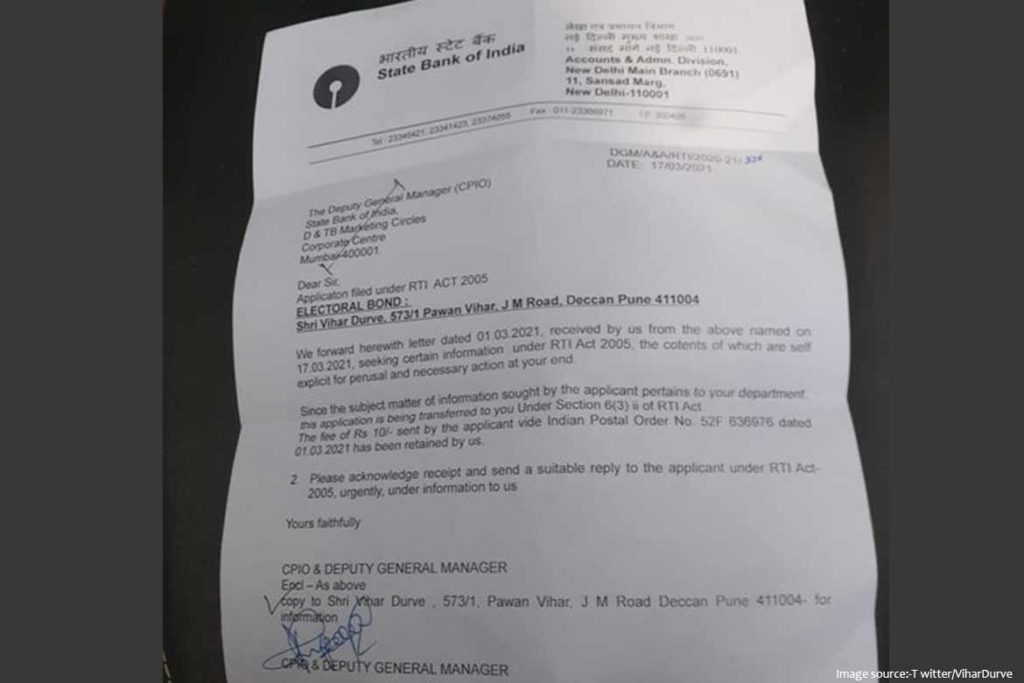Assembly elections are ahead in five states, just before that, a hearing was held in the Supreme Court regarding the sale of electoral bonds. A petition was filed by the Association for Democratic Reforms (ADR). The case was heard by a bench of Chief Justice Bobde. An application was made demanding a moratorium on the electoral bonds to be issued from April 1 with immediate effect. At present, the court has reserved its verdict. The CJI SA Bobde Bench has heard the matter in view of the assembly elections in West Bengal, Assam, Tamil Nadu, Kerala and Puducherry.
A route to bribe political parties: Prashant Bhusan
Advocate Prashant Bhushan, on behalf of ADR, has said that parties are abusing these bonds. Shell companies are using it to launder money.Only the government is aware of the buyer. The Election Commission cannot take any information related to it. He said that it is a kind of currency. It is a way to bribe a political party.
SC reserves order on stay of anonymous Electoral bonds.Our submission:"The only person who wants anonymity in Pol donation is the person who is paying bribe to the party in power. It is only anonymous to others¬ anonymous to the Govt who knows the donorhttps://t.co/gBoWmrI6tQ
— Prashant Bhushan (@pbhushan1) March 24, 2021
Prashant told the court that there is a possibility of fraud here. The government has brought this system after demonetisation. Black money is being consumed by this. There has been a lot of opposition to this move of the government. Along with this, he said that the government is talking about abolishing black money on one side. At the same time, Bond on the other hand is tarnishing the image of the government.
What is an electoral bond?

The Electoral Bond Scheme was introduced by the then Finance Minister Arun Jaitley in the 2017 budget. It was notified by the Central Government on 29 January 2018. This is a kind of promissory note, also known as a banknote. Any Indian citizen or company can buy it. If you want to buy it, you will find it in the selected branch of the State Bank of India. The purchaser can donate this bond to the party of his choice. Only that party will be eligible for this.
Eligible parties
A bond buyer can buy bonds ranging from Rs.1000 to Rs.1 crore. The buyer has to give his full KYC details to the bank. The party that the buyer wants to donate this bond must have got at least 1% of the vote in the last Lok Sabha or Assembly elections. Within 15 days of the donor donating the bond, that party must cash it from the Election Commission from the verified bank account.

Parties that are eligible to take electoral bonds. They have to give a bank account number to the Election Commission to verify. This account is called a verified bank account. All transactions involving electoral bonds have to be done with this account.
When one can buy these bonds?
Electoral bonds can be purchased within the first 10 dates of any quarter. That is, between 1 to 10 of January, April, July and September, you can buy electoral bonds. That is why on Thursday, advocate Prashant Bhushan referred to April 1 in his plea.
Benefit to buyer
The donor is not named on the electoral bond. His details are only with the bank. In such a situation, the party does not know the source of the donation. Those who donate electoral bonds get tax exemption. At the same time, the party receiving it also does not have to pay tax. However, both have to show it in their tax return. The government claims to keep the identity of the donor a secret.
Why it is disputed?
In 2017, ArunJaitley, while presenting it, claimed that this would bring transparency in funding and election system to political parties. Black money will be curbed.
However, those who oppose it say that the identity of the buyer of the electoral bonds is not disclosed, this could make them the means of using black money in elections. Shell companies may be formed only for electoral funding. Prashant Bhushan mentioned the same thing on Thursday.
At the same time, some people allege that this scheme has been brought into consideration by big corporate houses. With this, these corporate houses can give as manydonations to political parties as they can without identifying themselves.
MVA Govt in Maharashtra must immediately constitute a Special Investigation Team (SIT) on
— Srivatsa (@srivatsayb) March 24, 2021
?Judge Brijgopal Loya Murder
?Electoral Bond Scam
?PMC Bank Scam
Investigate and Punish the crimes of MoSha.
Requesting CM Uddhav Thackeray to ensure Justice for Judge Loya.
In 2017, the ADR petitioned for a stay on the electoral bond scheme. A hearing took place on Thursday. It said that if electoral bonds are procured during elections in five states, illegal funding to political parties through shell companies will increase.
On the other hand, the government has been consistently defending the scheme. In 2018, in response to a question in the Lok Sabha, Minister of State for Finance Anurag Thakur said that the Benami money received to the parties has stopped due to the introduction of electoral bonds. Now everyone who is buying the bond, the party receiving donations is aware and this is a transparent system.
The party receiving maximum benefit
According to the ADR, in 2017, the first year after the scheme came in, political parties received a donation of 222 crore rupees through electoral bonds. Of this, BJP alone got 210 crore rupees. The Congress received donations of Rs 5 crore and other parties only Rs 7 crore.
